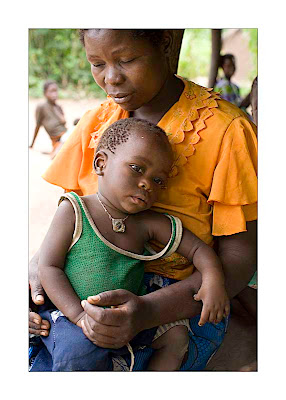
Around noon, in the full heat of the day, I met Fanny Chikopa and her youngest child, Mphatso, in a small village near Chickweo.
Fanny has four children.
Each day, her husband walks for several hours to a nearby lake and works as a fisherman. When all goes well, he catches "chambo" and "matemba."
Unfortunately, at the end of the day his nets are often empty.
To help support the family, Fanny tends a small garden of corn and pumpkins near her brick and mud home.
During hunger season, like so many other families in their village, Fanny has little food to feed her children.
Fanny spoke about the challenge of making it through January, February, and March each year.
Poverty and hunger are not a new experience for Fanny. She has five brothers and four sisters. Quite typical for Malawi. Her parents and her siblings live in the same village.
You may note the charm on Mphatso's neck.
There is a story behind this piece of powerful jewelry.
A tribal "healer" made this necklace for Mhpatso to overcome sickness at a young age.
When Mphatso was eight months old, he was very sick. His eyes were infected and he struggled to maintain general health.
At first, Fanny took her son to the local, rural hospital. Unfortunately, after weeks of treatment, he did not get well with traditional, western, "allopathic" medicine.
So, Fanny took Mphatso to see a tribal doctor to gather a "second opinion."
The local traditional "healer" assessed Mphatso's illness and informed Fanny that "the bones in her son's head were not united." The "healer" then told Fanny that Mphatso's head would grow large if he was not treated with special herbs.
Fanny paid a fee of 50 Kwacha (33 cents) and the "healer" mixed a special potion of herbs.
The "healer" then wrapped the herbs in cloth and tied thread around the "medicine" - the necklace shown in the picture.
Mphatso has been wearing this "medicine" for four months.
Fanny said that Mphatso has ten more months of treatment to finish his therapy.
Apparently, ever since the necklace was put in place, Mphatso's eyes improved and his health changed dramatically.
Fanny is convinced that the traditional medicine led to Mphatso's recovery.
Who knows? From my vantage point, this may be true.
Faith and momentum in one's beliefs are powerful tools.
In a few months, Mhpatso, which translates as "gift" in english, will walk about in a colorful, difficult world.
Harvest will bring plenty of corn and vegetables for the early months of the Spring and Summer, yet the annual hunger cycle and challenges associated with extreme poverty will likely continue.
Mphatso's early path has been touched by both the old and the new.
Yet, his future is filled with uncertainty.
How Malawi will change? My guess? Slowly.
How will his village evolve? It depends. Roads and infrastructure can transform a region in a few years, but the resources to create these changes are not readily available. The tribal chiefs I met with indicated it is harder now than it was years ago for families across the region.
Will there be a solution to food shortages and extreme poverty that is sustainable and effective? This is complex. No one has a viable and proven path at this time.
It may take several generations before electricity and clean water are widely available near Mphatso's home.
One thing is clear. Mphatso needs both traditional and modern faith, a deeper education than his parents and grand parents, and new opportunities to thrive.

Jeff,
ReplyDeleteThe "placebo" effect is incredible. Your story is a great example. This experience of yours in this environment has to be an emotional roller coaster.
Hawk
Hawk,
ReplyDeleteEach day, my heart is pulled and pushed, inspired, and stretched. Tis a world of great color, motion, and resiliency, yet there is pain and suffering and poverty that stretches beyond my imagination. Thank you for staying in such close touch. Jeff